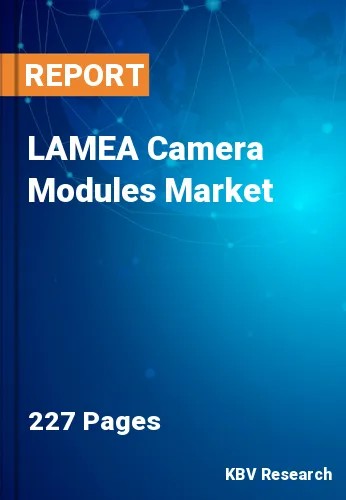The Latin America, Middle East and Africa Camera Modules Market would witness market growth of 10.0% CAGR during the forecast period (2023-2030). In the year 2026, the LAMEA market's volume is expected to surge to 71.7 million units, showcasing a growth of 11.3% (2023-2030).
The industrial and manufacturing sector has embraced camera modules for quality control and automation. Machine vision systems use cameras to inspect products on production lines, identify defects and ensure consistency in manufacturing processes. This improves product quality, reduces waste, and lowers production costs. Robotic systems in industries like logistics and agriculture rely on camera modules for navigation and object recognition. These cameras enable robots to work collaboratively with humans and perform complex tasks autonomously, such as picking and packing items in warehouses or identifying and sorting fruits in orchards.
Furthermore, advancements in semiconductor technology have allowed camera modules to become smaller and more energy-efficient while delivering higher performance. This miniaturization has enabled their integration into various devices, from the smallest IoT sensors to smartphones. The economies of scale achieved through mass production have significantly lowered the cost of camera modules, making them accessible to a broader range of applications and consumers.
Brazilians have increasingly embraced smartphones as essential tools for communication, entertainment, and even financial transactions. Notably, in Brazil, the local smartphone manufacturer Positivo Tecnologia has gained prominence, offering affordable and feature-rich devices tailored to the preferences and needs of Brazilian consumers. In addition, the expansion of e-commerce platforms and the availability of various consumer electronics, such as smart TVs, wearable devices, and home automation systems, have all contributed to the rising adoption of consumer electronics in Brazil. In addition, according to a briefing titled Brazil’s Economy by the European Parliament, manufacturing in Brazil accounts for about 20 % of the GDP. The country exports automobiles, electronics, and consumer goods. Due to these factors, the demand for camera modules will increase in the LAMEA region.
The Brazil market dominated the LAMEA Camera Modules Market by Country in 2022, and would continue to be a dominant market till 2030; thereby, achieving a market value of $1,252.9 million by 2030. The Argentina market is showcasing a CAGR of 10.6% during (2023 - 2030). Additionally, The UAE market would register a CAGR of 9.7% during (2023 - 2030).
Based on Interface, the market is segmented into Serial and Parallel. Based on Focus Type, the market is segmented into Fixed Focus and Auto Focus. Based on Pixel, the market is segmented into Upto 7 MP, 8 - 13 MP and Above 13 MP. Based on Component, the market is segmented into Image Sensors (CCD, CMOS, and Others), Lens Modules, Voice Coil Motor and Others. Based on Industry, the market is segmented into Consumer Electronics (Smartphones, Camera, Tablets & PC, Wearable and Others), Automotive, Security & Surveillance, Industrial, and Others. Based on countries, the market is segmented into Brazil, Argentina, UAE, Saudi Arabia, South Africa, Nigeria, and Rest of LAMEA.
Free Valuable Insights: The Worldwide Camera Modules Market is Projected to reach USD 78.2 Billion by 2030, at a CAGR of 9.2%
The market research report covers the analysis of key stake holders of the market. Key companies profiled in the report include Hon Hai Precision Industry Co., Ltd., Sony Corporation, Intel Corporation, Samsung Electro-Mechanics Co., Ltd. (Samsung Electronics Co., Ltd.), Fujifilm Holdings Corporation, OmniVision Technologies, Inc. (OmniVision Group-Shanghai Weir Semiconductor Co., Ltd.), ams-OSRAM AG, STMicroelectronics N.V., Sharp Corporation, and ON Semiconductor Corporation.
By Interface (Volume, Million Units, USD Million, 2019-2030)
By Focus Type (Volume, Million Units, USD Million, 2019-2030)
By Pixel (Volume, Million Units, USD Million, 2019-2030)
By Component
By Industry (Volume, Million Units, USD Million, 2019-2030)
By Country (Volume, Million Units, USD Million, 2019-2030)
Our team of dedicated experts can provide you with attractive expansion opportunities for your business.

